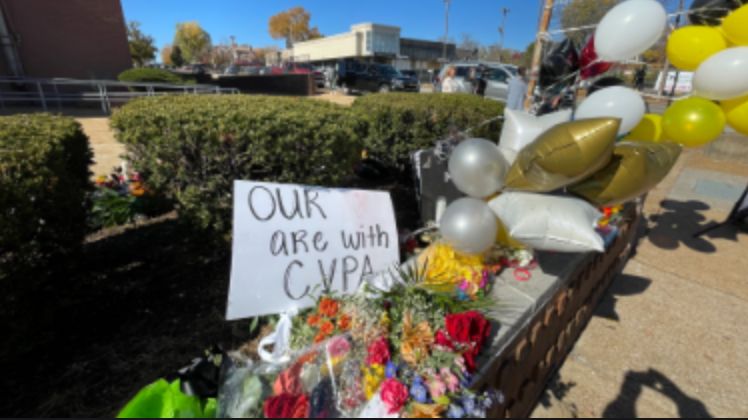ST. LOUIS– Thursday marks the first day Missouri state lawmakers can file legislation to be taken up in the 2023 session set to begin in January.
Of course, filing a bill doesn’t guarantee it will necessarily go anywhere once the action starts in Jefferson City, but it is the public’s first look at priorities. Lawmakers, fresh off an election cycle, are coming off of a 2022 session dominated by fights in both chambers over congressional redistricting, and a split between the GOP leadership in the Senate and a more conservative faction in the body that spilled out into the open.
In the House, the fatal school shooting in October at the Central Visual and Performing Arts High School, which shares a campus with the Collegiate School of Medicine and Bioscience, has helped inspire at least one measure filed Thursday.
State Rep. David Tyson Smith, a Mid-Missouri Democrat, pre-filed House Bill 208, which would make the purchase, sale or lease of a semi-automatic or automatic firearm to someone under the age of 20 a class A misdemeanor.
“In the past few months, we have seen truly horrific acts of violence committed by deeply mentally unstable teenagers using firearms they legally purchased,” Smith said. “Had this bill been in place, the mass shooter who terrorized Central Visual and Performing Arts High School in St. Louis in October would not have been able to obtain the firearm he used to kill a student and a teacher.”
The schools are in the 80th State House district represented by St. Louis Democrat Peter Merideth, who has a niece who teaches at CVPA. On Thursday, he reintroduced a call for a constitutional amendment requiring a background check for all firearms transfers and to require a permit to conceal carry a firearm.
The shooter in the St. Louis case failed to pass a background check when attempting to buy a weapon from a licensed dealer but was able to purchase the weapon used in the school shooting in a private sale.
Merideth told Spectrum News he’s filed versions of the legislation in previous years but said having the incident happen in his district “has lit a bit of a fire under me now.”
He’s preparing a package of bills for the session, including a “Red Flag” bill mirroring legislation signed by then-Florida Gov. Rick Scott, a Republican now in the U.S. Senate. He said he would also look to introduce a measure to repeal a portion of the Second Amendment Preservation Act, or SAPA, the 2021 bill that is the subject of state and federal lawsuits over claims that it negates federal gun laws. Merideth would roll back a portion of the law that makes law enforcement agencies liable for civil suits of $50,000 per employee in an agency's department if a plaintiff believes second amendment rights have been violated by state and local law enforcement.
The Missouri Chamber of Commerce and Industry said over the summer it was willing to put some of its lobbying muscle behind SAPA reform in the coming session as a way of addressing the larger issue of crime in the St. Louis region.
Democrats in both the House and State Senate face the political reality that Republicans still hold supermajorities, meaning that even getting a hearing on legislation could prove to be a challenge.
Merideth says he believes that teachers, students and law enforcement that survived the CVPA shooting are ready to use their voices and could help break through a partisan divide.
“This was not their first and won’t be the last time they experience gun violence,” he said.
Senate
The State Senate will feature a handful of new faces representing parts of the St. Louis region. Among them is Republican Mary Elizabeth Coleman, representing Jefferson County. On Thursday, she introduced a measure that would allow parents to use the state’s share of the cost of educating children, to send kids to any school, public or private.
Coleman said the current system which ties children attending public schools based on their address“hasn’t changed the dynamic” for students in struggling districts. While some private schools do provide transportation, under Coleman’s bill, parents would be responsible for it if they were to send their children to another public district.
The bill would not change the state school transportation or foundation formulas. Coleman sees it as a potential cost savings for the state in cases where a receiving school district or private school may be able to cover the cost of educating a student for less than the state’s share. The difference would be returned to the state.
Five new members in the Senate come from the House, including Democrat Tracy McCreery, representing parts of St. Louis County, Republicans Travis Fitzwater and Nick Schroer, who each represent parts of St. Charles County. Coleman, who also comes from the House, is optimistic that the relationships built there can carry over.
“We genuinely like eachother,” she said.
McCreery on Thursday introduced a measure that would expand the mandated reporter safety net in suspected cases of child abuse by adding animal control officers and animal humane investigators, and would require psychologists, social workers, school counselors, and teachers among others to report animal abuse.
State Sen. Bill Eigel, a Republican from St. Charles County, told Spectrum News he’s filed measures to eliminate personal property tax, and a transportation infrastructure bill that would use current state surpluses and future revenue to rebuild Interstate 70 to four lanes in both directions. Eigel, who is considering a run for Governor in 2024, was a member of the now-defunct Conservative Caucus, which fought bitterly with GOP leadership in the Senate for much of the past two sessions. The group disbanded after the August primaries, citing the fact that Republican primary voters approved "the conservative message espoused by conservative caucus-aligned Republicans,” and that it was time to go on "offense" as a united party caucus.
The 2023 regular session opens Wednesday January 4, 2023.



